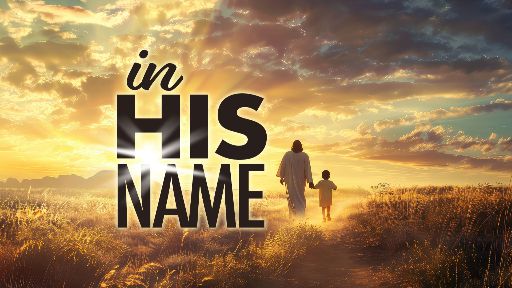-
God, What's Your Name? Series
Contributed by Jeff Strite on Oct 25, 2021 (message contributor)
Summary: Moses didn't want to go to Egypt. But why would he bring up the issue of what God's name was, and what can God's answer to Moses mean to us?
A woman was trying to cash her husband’s paycheck when she realized that her husband, Mark, hadn’t signed it. So, she sent her four-year-old Chelsea upstairs to ‘get Daddy’s name on the back of the check.’ Her daughter came back, handed it to her mother, and said, “I knew his name so I did it myself.” On the back of the check, 4 year old Chelsea had printed, “D-A-D.” (Sheila Schultz, Wilmore, Kentucky, ChristianityToday.com 1/20/09)
Chelsea KNEW her daddy’s name. That’s the name she knew him by. But Moses said he didn’t know his God’s name. When God told Moses that he was to go to Pharaoh and “bring My people, the children of Israel out of Egypt” (Exodus 3:10) Moses replied: “Suppose I go to the Israelites and say to them, ‘The God of your fathers has sent me to you,’ and they ask me, ‘What is his name?’ Then what shall I tell them?" (Exodus 3:13)
Now, bear in mind, Moses didn’t want to go to Egypt. He was just looking for an excuse that might distract God and help get him out of this job interview. You see, when people want to avoid being involved with God they’ll often use an argument like this so that they can distract Christians who want to share their faith.
Usually, the argument goes – All gods are the same. What make you think YOUR God is any different than all the other gods? OR, as this graphic (which we put on the screen) puts it: “I believe all religions worship the same god. The differences in religions are cultural. I’m spiritual. I call my higher power ‘the universe.’”
In the days of Moses, Egypt had over 2000 gods that they worshipped, and they all had different names: Isis… Osiris… Horus… Amun… Ra… Anubis are just a few.
So God… what’s your name? What makes you any different that all the gods of Egypt?
ILLUS: Every religion - except Judaism and Christianity - worship an IMPERSONAL god(s), and they all have varying beliefs in the afterlife. They either believe that there is no afterlife, or they believe they can earn by their good deeds. If they do enough good stuff… they’ve paid for their ticket and get what’s been promised.
But by contrast, the God of the Bible is a personal God who offers heaven to those who seek Him. A preacher named Joel Smith made this observation:
“If God reveals himself through ALL the world religions, then we’re left with two options concerning his character. If pluralism is true, God is either a liar or a schizophrenic. The differences are too deep to conclude that all religions lead to the same destination. I suspect that people who support such a view have never really examined where the different faith groups diverge. A god who would devise such a system is either a liar, telling one group “This is the way” and another group “That is the way.” Or he’s schizophrenic. He has a multiple personality disorder. One day he’s Shiva, the destroyer. The next, he’s Brahma an impersonal force pervading the universe. The god you get depends on what day you bump into him. And if he’s a liar or a schizophrenic, he’s not a god that I want to trust or follow.”
And that was pretty much the way things were in Egypt. With over 2000 gods, the god you got depended on what day you bumped into whatever god you ended up.
But God wasn’t about to be distracted by petty theology. He simply said: “I AM WHO I AM. This is what you are to say to the Israelites: ‘I AM has sent me to you.’” Exodus 3:14
(PAUSE) Alright… what does that mean? Well, I can think of a few possibilities:
First – when God said “I AM WHO I AM” He was saying: I am God… there aren’t any other gods. Psalms 40:4 says “Blessed is the man who makes the LORD his trust, who does not look to the proud, to those who turn aside to FALSE gods.” Psalms 96:5 tells us “For all the gods of the nations are idols, but the LORD made the heavens.” In other words - the God of Scripture is the ONLY God. All the rest are imitations. They’re FALSE gods.
Secondly – when God said “I AM WHO I AM” He was declaring that He is will always be there.
Someone once said it this way: “He is not the great “I Was” Or the great “I Am Going To Be.” He is the great I AM..
A woman named Helen Mallicoat wrote this poem: “I was regretting the past and fearing the future. Suddenly my Lord was speaking: “MY NAME IS - I AM.” He paused. I waited. He continued. When you live in the PAST with its mistakes and regrets it’s hard, because I’m not there. My name is not I was. When you live in the FUTURE, with its problems and fears - its hard, because I’m not there. My name is not I will be. But when you live IN THE MOMENT, it’s not hard because I AM HERE. My name is I AM.”

 Sermon Central
Sermon Central



